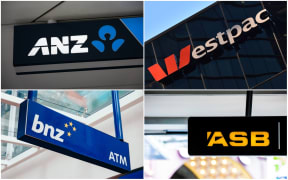New rules are needed to force the banking sector to introduce changes to protect consumers, and a muscled-up Kiwibank is not a quick fix, consumer advocates say.

Lack of competition in the banking sector has been highlighted in a preliminary report from the Commerce Commission. Photo: 123RF
There is a lack of competition in the personal banking sector and the New Zealand-owned Kiwibank is too small to disrupt the market, a draft Commerce Commission report has found.
The market has two tiers, it said: with the big four Australian-owned banks dominating the major share and smaller operators offering no threat to that dominance.
It recommended a mid-2026 deadline for regulations to force open banking in New Zealand. Open banking makes it easier for customers to switch banks while keeping their existing account numbers, and allows customers to let third parties access their banking details to provide budgeting services and advice.
But Consumer NZ chief executive Jon Duffy told Morning Report that while the industry has been "on notice" about open banking for years, banks have been slow to voluntarily put in place systems to protect customers from fraud, and the government should take a firm stance with the sector.
While it was not that difficult to switch banks, Duffy said most people believed it was: "It's actually not as hard as people think ... but it can seem a huge amount of work and life admin ... The problem is it's not in the banks' interest to give the impression that it's easy, so a lot of people just avoid it."
A survey had showed only about 3 percent of people canvassed had switched banks last year, which was "tragically low", Duffy said.
"But if you have the ability to port your data from one bank to another you can shop around for the best deals, you might have one bank offering your transaction account, another bank offering your mortgage, another fintech providing some form of financial advice or management. The sky's kind of the limit with what you can do with open banking."
Open banking could be a major disruption to how the sector had been operating, but the resulting change would take time, as new entrants entered the sector as a result of the changes, Duffy said.
A 2026 timeframe for open banking to be mandated was doable, he said, because the legal mechanisms required to make it easier for people to shift between banks were already mostly in place.
"We're encouraged by the idea that there's now at least some sort of deadline being mooted. We really think the government needs to step in here and make sure that that is mandatory."
Sam Stubbs, managing director of non-profit KiwiSaver provider and fund manager Simplicity said the banks were "dragging the chain" on important actions to protect their customers.
"What we need is legislation which forces the same open banking the OECD have now had in place for 10 years, and ironically the same Australian banks operating here have had in Australia for the last five years," Stubbs said.
"Turkey's won't vote for Christmas. They won't do it themselves, they have to be forced to do it.
"What they have to do is pass this legislation and get it done quickly, because banks are making $300 a second at the moment in profits, out of ordinary New Zealanders - about 20 percent more than they do out of the equivalent Australian, and this is the same bank. And we have to do something about it.
"The industry is unified in saying open banking is the long-term solution, the Commerce Commission seem to be saying that, so let's just get it done. So let's just get it done and stop obfuscating and delaying - it's been an absolute master class in that."
Banking Association chief executive Roger Beaumont said: "On the competition front it's important to remember there are at least 13 banks in the country who fight hard for every customer, and that's for a country the side of Sydney.
"And what the market study shows is that the major barriers to new competitors joining are actually regulatory issues, rather than anything else."
Banking sector break-up would protect the public - Monopoly Watch
Monopoly Watch told the Commerce Commission the sector should be reigned in by breaking up the dominant banks' hold.

Photo: 123RF
Tex Edwards, the director of the public policy group established to examine New Zealand's supermarket industry, told RNZ it would have both a direct benefit to consumers and would reduce risk exposure in the case of a bank failing.
"Why should the tax-payer or the shareholders of Kiwibank, have to pay for this? It's important that the tax-payer isn't having to fit the bill for a monopoly. A break-up in our minds should still be on the table, and a break-up should absolutely be the consequence for a delay in open banking.
"There's precedent for it ... we had our banking executive from the UK talk to the Commerce Commission about the process in which the British government broke up some of their banks.
"Because there's less risk to the community that the tax-payer has to do a bail-out - you get two benefits from a split up."
Government juggling investment in banking sector with other priorities
It was too early to say what the government could do to fix the system: Minister of Commerce and Consumer Affairs Andrew Bayly told Checkpoint's Lisa Owen: "We've only just received the report".
But injecting money into Kiwibank in an attempt to address the challenges in the sector would be a challenge.
However one option could be getting more outside investment into Kiwibank, and the government was open-minded about the possibility of selling part of Kiwibank.
"So right now the question is would you contemplate putting money into the banking sector to support Kiwibank, or do we need to put it into health, education and schools? And I think at the moment we probably want it to go into health, education and schools.
"You're talking about a $10 billion investment."
Bayly said the government would try to get open banking up and running by 2026, but he was not making any promises.
"To achieve open banking you've got to do the consumer data rights, you've also got to work out how you identify people and also how you transfer data, ... and deal with what's called anti-money laundering."
The idea of selling 49 percent of Kiwibank to raise funds had been floated by Simplicity, and Sam Stubbs said it could have ongoing benefits.
"I don't think it would be particularly difficult, the government's mixed-ownership model is already in place for the power companies ... how much money it would raise would be dependent on the time and how much buyers were be prepared to pay, but it almost certainly would be worth billions of dollars.
"I think what's important though is if they list 49 percent, then the stock-market becomes a place where they can subsequently raise other capital, and like every other listed bank in the world they'd be able to raise money to grow."
Another option being considered by the government is calling banks before a select committee into the sector.
However Monopoly Watch's Tex Edwards said they should be sceptical about whether the banks would be transparent about their profits and operations.
"The real challenge and energy that the select committee should fix their focus on, is 'what is the consequences of missing open banking, and how do you fix this problem?' ... It's regulation and creating competition. The thing we need here is substance, legislation."
Duffy said after the Commerce Commission's report "the government has to have the courage act".
"We'd also say that in terms of the lack of innovation, while you're mandating things, you should also mandate that banks need to update their security systems and their fraud prevention systems, because New Zealanders are losing half a million dollars a day to scams at the moment."






